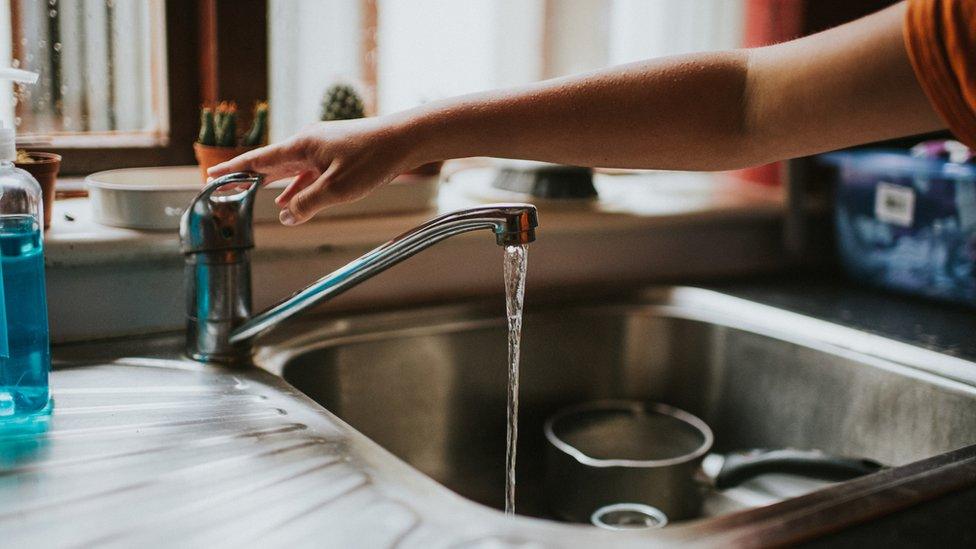Scottish Water workers to strike as executive pay criticised
- Published

Scottish Water workers are set to begin strike action over pay - as the firm faces criticism for awarding three executives nearly £3m since 2021.
The payments to Douglas Millican, Alan Scott and Peter Farrer included almost £1.1m in bonuses.
The company's annual accounts show each of the executives received a six-figure long-term incentive payment in 2022.
It comes as hundreds of staff prepare to begin four days of strikes on Friday in a dispute over pay and grading.
Scottish Water said it was dismayed that unions had taken this course of action while it remained "committed to reaching an agreement".
Members of the Unite and Unison unions announced last month that they would walk out from 10-13 November.
Unite said its strikes would carry on weekly over the following three months. Members of the GMB union are also planning strike action.
Unison claim a new pay grading proposal would see the earnings of the lowest-paid workers drop by up to £5,000.
It said any reported problems with public water supply, sewage or drainage would not be dealt with while staff are on strike.
Ahead of the walkout, Unison regional organiser Emma Phillips described Scottish Water as "a rogue employer".
She said: "Scottish Water is ripping up the government's fair work and equality guidance and it's just not good enough - our members deserve better.
"If the Scottish government don't intervene, then they have been warned that they are storing up problems over pay structures and future equal pay.
"Re-grading has to be done properly with the full involvement of staff and unions."
Sewage levels
Unite said pay talks so far had been "a waste of time". The union's general secretary, Sharon Graham, said: "It appears to be the case that the bosses in the boardroom will only listen to us when our members have taken to the picket lines across Scotland."
Scottish Water said plans were in place to protect essential services for customers ahead of industrial action kicking off.
The company's chief operating Officer, Peter Farrer, said: "Scottish Water remains committed to reaching an agreement with our unions that avoids industrial action.
"This has been the case throughout the negotiations over the proposal to modernise a 21-year-old pay and grading structure and provide employees with an in-year award of at least 8% for all.
"We will do all we can to ensure customers do not experience any disruption to their water supplies and that treatment of the country's waste water continues as usual, despite the industrial action.
"We are dismayed the unions have taken this course of action over what, at 8% or more for all, is an exceptional proposal for our people and one of the best in the public sector."

Scottish Water says essential services for customers will be protected during strike action
First Minister Humza Yousaf said the pay of Scottish Water executives was "in line with public sector pay rules".
Speaking at First Minister's Questions, he insisted that the pay structure helped Scottish Water "attract and retain highly-experienced personnel to run a vital public service".
When questioned about the workers' pay dispute, Mr Yousaf said he hoped strike action could be averted and added: "The Scottish government has a very strong track record of ensuring workers are paid fairly".
Scottish Water has come under scrutiny in recent months from the Scottish Liberal Democrats, who have said the Scottish government was letting the agency "off the hook" after it was revealed 50 of Scotland's 89 bathing waters were deemed to contain unsafe levels of sewage.
Party leader Alex Cole-Hamilton said: "It is utterly shameful that we have a government-owned water company where execs pocket bumper bonuses while our rivers, lochs and coastlines are destroyed.
"We don't even know the true scale of this destruction because only a pitiful fraction of sewage discharge points are properly monitored.
"Nobody should be rewarded for pumping sewage into our rivers and waterways."


There's a lot of politics silting up the Scottish Water strike, as opposition MSPs see an opportunity to put pressure on the SNP.
That's while the Scottish government is sole shareholder in the company, saying it wants to retain operational independence at an arm's length.
The dispute stems from two strands of negotiation earlier this year - one on pay, the other on reforming the pay banding structure, which is 21 years old.
There's agreement on the need for grading reform and for a pay rise, but negotiations turned sour in early summer when management put the two strands together, and made an 8% pay offer conditional on accepting a new grading system.
It's not clear, at least in public, if the three unions in dispute accept or reject the grading system. What they want to establish is that regrading should be negotiated separately.
Talks about that and the dispute ran into the early hours of Thursday morning, without agreement. Further talks are planned for next week, with the Arbitration and Conciliation Service on hand.
Management want unions to ballot on a new pay offer, tabled two weeks ago, which backdates the pay increase to April rather than July, and irons out some anomalies affecting those at the top of pay bands.
Soured relationships
Unions have also registered their dislike at the company carrying out its own ballot of more than 4,000 staff, which resulted in 76% of those responding saying they supported the management proposals. That looks to union negotiators like going behind their backs.
Meanwhile, they are happy to see MSPs now put pressure on management over pay, more than four months after the top executives' pay and bonuses were published in the annual accounts.
So the parts of this dispute that are not about politics seem to be largely about process. Added to that mix is the relationship between GMB, Unite and Unison, which are working together on this, but where relations were soured recently by Unison going its own way on the school staff dispute.
What will all this mean for customers of Scottish Water? That's almost everyone in Scotland.
Nobody knows. It is definitely not following the Northern Ireland example when a strike began with an instruction to boil drinking water.
Most people won't see much difference, unless there is severe weather leading to blocked or overwhelmed drains, or if equipment fails in water or sewerage treatment plants.
That is when there could be instructions to boil water, but that would be localised.
The management is less concerned about the sewerage end of operations, because much of that is handled by contractors.
As much of the infrastructure is ageing, it is unpredictable where problems will arise. But there is enough, in normal times, to keep a lot of Scottish Water staff busy on equipment upgrades and unblocking sewers.
So there is even more reason not to put wet wipes down the toilet. Scottish Water says it has to respond to an average of 100 blockages per day - 36,000 a year - and wet wipes are the leading cause of such call-outs.
